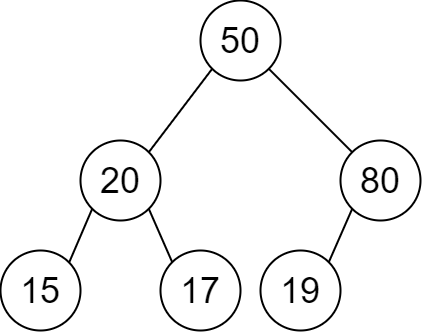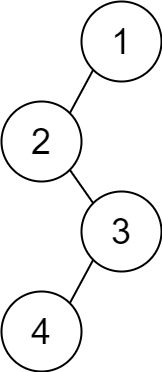2196. Create Binary Tree From Descriptions
Description
You are given a 2D integer array descriptions where descriptions[i] = [parenti, childi, isLefti] indicates that parenti is the parent of childi in a binary tree of unique values. Furthermore,
- If
isLefti == 1, thenchildiis the left child ofparenti. - If
isLefti == 0, thenchildiis the right child ofparenti.
Construct the binary tree described by descriptions and return its root.
The test cases will be generated such that the binary tree is valid.
Example 1:

Input: descriptions = [[20,15,1],[20,17,0],[50,20,1],[50,80,0],[80,19,1]] Output: [50,20,80,15,17,19] Explanation: The root node is the node with value 50 since it has no parent. The resulting binary tree is shown in the diagram.
Example 2:

Input: descriptions = [[1,2,1],[2,3,0],[3,4,1]] Output: [1,2,null,null,3,4] Explanation: The root node is the node with value 1 since it has no parent. The resulting binary tree is shown in the diagram.
Constraints:
1 <= descriptions.length <= 104descriptions[i].length == 31 <= parenti, childi <= 1050 <= isLefti <= 1- The binary tree described by
descriptionsis valid.
Solutions
Solution: Hash Table
- Time complexity: O(n)
- Space complexity: O(n)
JavaScript
js
/**
* Definition for a binary tree node.
* function TreeNode(val, left, right) {
* this.val = (val===undefined ? 0 : val)
* this.left = (left===undefined ? null : left)
* this.right = (right===undefined ? null : right)
* }
*/
/**
* @param {number[][]} descriptions
* @return {TreeNode}
*/
const createBinaryTree = function (descriptions) {
const nodeMap = new Map();
const isRootMap = new Map();
for (const [parent, child, isLeft] of descriptions) {
if (!nodeMap.has(parent)) nodeMap.set(parent, new TreeNode(parent));
if (!nodeMap.has(child)) nodeMap.set(child, new TreeNode(child));
const parentNode = nodeMap.get(parent);
const chidNode = nodeMap.get(child);
isLeft ? (parentNode.left = chidNode) : (parentNode.right = chidNode);
isRootMap.set(child, false);
if (isRootMap.has(parent) && !isRootMap.get(parent)) continue;
isRootMap.set(parent, true);
}
for (const [node, isRoot] of isRootMap) {
if (isRoot) return nodeMap.get(node);
}
};